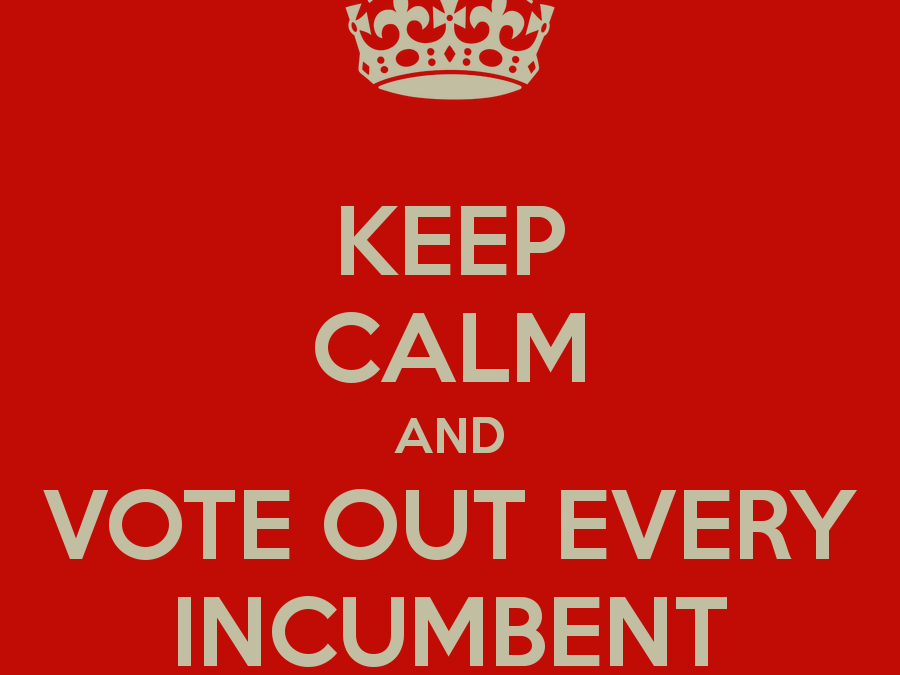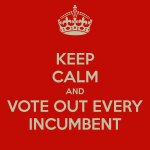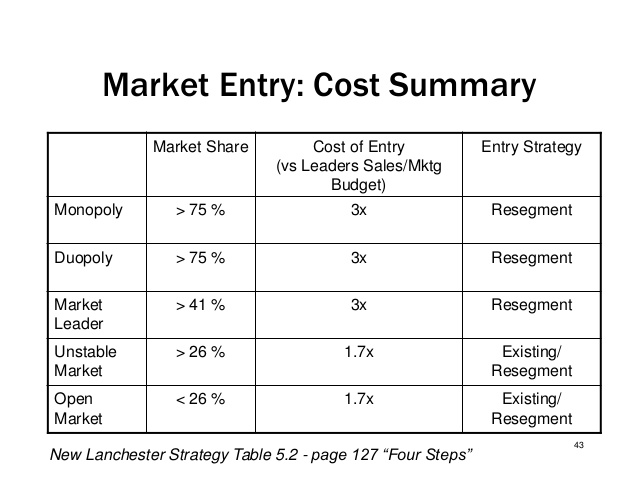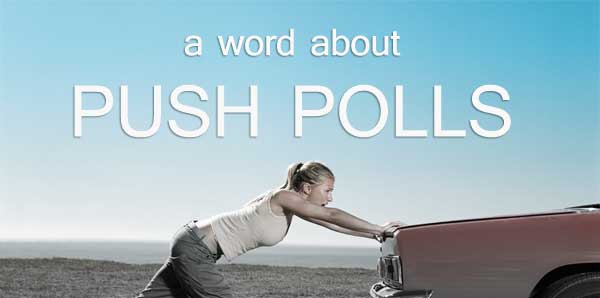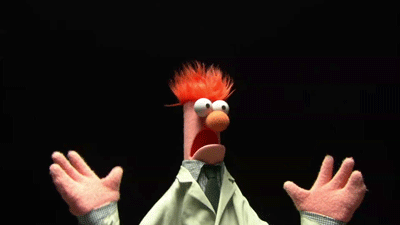
by Alex Patton | Mar 12, 2015 | Political Consulting
There is a difference between descriptive statistics and inferential statistics. There is also a difference between the following two questions:
- What are my chances of challenging an incumbent? and
- If I decide to challenge an incumbent, what do I need to do to be successful?
Today, we explore second question.
If I decide to challenge an incumbent, what do I need to do to be successful?
People are upset and anxious and with these feelings comes the desire to throw out every incumbent, but that seldom happens. Why?
We are not going to explore the substantial advantages incumbents enjoy. We are going to set them aside and attempt to answer the question, “what does a challenger need to do to be successful?”
Often in politics, we borrow from other disciplines and blend them together. In attempting to answer this question, I am going to borrow heavily from business to build out a new theory on challenging an incumbent.
The specific theory I am going to use is the New Lanchester Strategy. The strategy has its roots in Britain and then used by Japan business as a closely guarded trade secret. The New Lanchester Strategy is considered one of the best tools available for determining market type choices for both start-ups and existing businesses and is used to formulate marketing plans with strategies to attack market share.
The theory has military, business and political implications.
The New Lanchester Strategy asks “How do you win customers for a new, improved offer? You must understand how customers decide, and you must target at their decision process. It means that the offered products or services must become irresistible for the target market.”
I came across the New Lanchester Strategy when reading The Four Steps to the Epiphany, by Steven Gary Blank. Mr. Blank is a founder of the lean start-up movement and the book is considered a classic book in the start-up world.
Mr. Blank removes the math and states:
- If a single company has 74% of the market, the market has become an effective monopoly. For a startup, that’s an unassailable position for a head-on assault
- If the combined market share for the market leader and second-ranking company is greater than 74% and the first company is within 1.7 times the share of the second, it means the market is held by a duopoly. This is also an unassailable position for a startup to attack.
- If a company has 41% market share and at least 1.7 times the market share of the next largest company, it is considered the market leader. For a startup, this too is a very difficult market to enter. Markets with a clear market leader are, for a startup an opportunity for re-segmentation.
- If the biggest player in a market has at least a 26% market share, the market is unstable, with a strong possibility of abrupt shifts in the company rankings. Here there may be some entry opportunities for startups or new products from existing players.
- If the biggest player has less than 26% market share, it has no real impact in influencing the market. Startups who want to enter an existing market find these the easiest to penetrate.
Blank adds two more important rules in the strategy that are particularly relevant:
- If you decide to attack a market that has just one dominant player, you need to be prepared to spend three times (3x) the combined sales and marketing budget of that dominant player.
- In a market that has multiple participants, the cost of entry is lower, but you still need to spend 1.7 times (1.7x) the combined sales and marketing budget of the company you plan to attack.

Political Implications of the New Lanchester Strategy
If we consider an incumbent politician as having established market-share, and if we switch market-share for favorability polling numbers or even elections results, we can start to apply the New Lanchester Strategy to politics and develop a substitute hypothesis.
I think the best substitute is favorability ratings because it should be more current than past election results.
I am going to over-simplify for a starting point.
- If an incumbent has a favorability rating over over 74%, it is an unassailable position for a head on-assault; possible with a strategy of re-segmentation.
- If an incumbent has favorability ratings between 41%-74%, it is still an unassailable position for a for a head on assault; possible with a strategy of re-segmentation.
- It is not until the favorability rating is less than 41%, do we observe an easier path to entry.
Blanks’s stunning finding using the New Lanchester Strategy: regardless of the specific market-share or favorability ratings, if you are going to challenge an incumbent, you need to spend 1.7 x – 3 x the communication budget of the incumbent to take market-share.
Conclusion
As a company that has run many challenges to incumbents, some successful, most not; it is difficult to explain to excited candidates the difficulties facing challengers – not even specific to your candidacy – but rather any challenger.
When challenging an incumbent, almost every card in the deck is stacked against the challenger.
Now, consider a political neophyte with no market-share.
Candidates often cite such events like Rep David Blat’s defeat of an Eric Cantor as proof of concept, but interestingly they never consider the true Black Swan nature of such a defeat.
Combine that fallacy with prospective incumbent challengers basing their campaign budgets on what either the incumbent or a previous unsuccessful challenger spent, and we have a recipe for defeat.
We are now going to take this new theory and back test it against races to where incumbents or politicians with high market-share (in open races) were defeated by successful challengers. Any bets whether this new theory holds true?
Our first case study will be Representative Curt Clawson’s win in Florida.
Additional Reading
New Lanchester Theory for Requirement Prioritization, Dr. Thomas Fehmann (PDF)
Lanchester Laws Apllied to Sales Campaign Succes by Paul McNeil (PDF)
The Four Steps to the Epiphany, by Steven Gary Blank (Amazon link, non-affiliate)

by Alex Patton | Feb 19, 2015 | Political Research

I’ve received several inquiries on whether or not a “push poll” was run in our local area this week. While I have not polled in the area in question, the question does provide a teachable moment about push polls.
What is a Push Poll?
The American Association of for Public Opinion Research has a lengthy definition and lists characteristics of a push poll.
Here is the gist:
Here are characteristics that will usually indicate to a respondent that the call is not a legitimate survey.
- One or only a few questions are asked, all about a single candidate or a single issue.
- The questions are uniformly strongly negative (or sometimes uniformly positive) descriptions of the candidate or issue.
- The organization conducting the calls is not named, or a phony name is used.
- Evasive answers are given in response to requests for more information about the survey.
In addition, the following characteristics will indicate to journalists, reporters, and survey professionals that a telephone call is not a legitimate survey.
- The number of people called is very large, sometimes many thousands.
- The calls are not based on a random sample.
- It is difficult to find out which organization conducted the interviews.
What is NOT a Push Poll?
A random sample poll testing negative statements is NOT a push poll.
Again, we look the AAPOR:
One way to tell is that message-testing surveys exhibit the characteristics of a legitimate survey, such as:
- At the beginning of the call, the interviewer clearly identifies the call center actually making the calls. (However, legitimate political polling firms will often choose not to identify the client who is sponsoring the research, be it a candidate or a political party, since that could bias the survey results.)
- The interview contains more than a few questions.
- The questions usually ask about more than one candidate or mention both sides of an issue.
- Questions, usually near the end of the interview, ask respondents to report demographic characteristics such as age, education level, and party identification.
- The survey is based on a random sample of voters.
- The number of respondents falls within the range of legitimate surveys, typically between 400 and 1500 interviews.
Conclusion about what is and is not a push poll
The Marketing Research Association (MRA), the American Association of Political Consultants (AAPC), the American Association of Public Opinion Research and the entire survey and opinion research profession, oppose the practice of “push polling”.
However, and here is the gist: Just because a pollster tests what you may perceive as a negative statement DOES NOT AUTOMATICALLY mean it is a push poll.
As a pollster there are legitimate reasons to test negative messages. As an example, sometimes we test negative messages to convince candidates or interest groups NOT to use the message.
The bottom line is: Please, before you accuse someone of unethical behavior or potentially a crime (in some states), you should know about the accusation you are leveling.

by Alex Patton | Apr 24, 2014 | Political Research

I have been thinking a lot about thermostats and politics lately.
This thought pattern has been driven by two things:
- I banned someone from my facebook page for the first time ever, and
- Two separate books I have been reading discuss thermostats and politics.
The Facebook Ban
First, the facebook ban.
As you may know, I am a weekly guest on a local talk radio show. I discuss politics, political strategy, and the science behind politics. Over the past few months, I have ‘engaged’ in a ‘debate’ with a loyal listener.
I am all for free speech, debate, and the exchange of ideas. I enjoy it, I enjoy different perspectives, and I enjoy being challenged.
However, our ‘debate’ always seemed to denigrate with this listener to a bullying session rather than any attempt to learn from one another. The listener’s mind was made up, and if you didn’t 100% agree, began the attempt to beat you into submission with a volley of name calling, fallacies, and curated ‘proof’ from selected blogs.
The final straw was when the listener fabricated and attributed to me things I didn’t say in an attempt to make a point. Even when corrected, the listener wouldn’t stop. All of this being done mostly on my facebook timeline.
A fanatic is one who can’t change his mind and won’t change the subject.
-Winston Churchill
Finally, I had enough of the nonsense, shrill rhetoric, and name calling. I banned the listener. It has been the most peaceful, glorious week.
Yes, you have a right to free speech, but I have a right to turn the channel.
However, the series of incidents served as a perfect, recent example of the overheated, political rhetoric of our times.
The Books
I have read two books in the past three weeks:
Schelling’s book, Micromotives and Macrobehavior, explores the relationship between individual’s decisions and their individual characteristics (micromotives) and aggregated social patterns (macrobehavior), and how these two influence each other. Because as we know from our previous studies, our observance of how people act is a powerful force on how we act. Schelling writes of ‘contingent behavior—behavior that depends on what others are doing.’
Ideology in America’s “main theme of this book, that when it comes to policy preferences, there are more liberals than conservatives. On average about 50% more Americans choose the liberal response (or the liberal end of a continuum) than choose the conservative response. Given a choice between left and right options for government activity, left prevails on average. And this pattern is robust. It will not matter what assumptions we make or what operations we perform. The picture will always be the same.”
So, one book about economics, the other book about political ideology and the disconnect in people’s stated political ideology and their policy preferences at an operational level of government.
When two separate and non-connected books (one authored by a Nobel prize winner) mention the same thermostat framework, it is time to place close attention.
Thermostats and Politics
The basic premises of both books is explained in Schelling’s Micromotives and Macrobehavior :
“The thermostat is a model of many behavior systems—human, vegetable, and mechanical.” (Schnelling)
“If the system is up to the task of attaining the desired temperature, it generates a cyclical process. The temperature rises in the morning to the level for which the thermostat is set—and overshoots it. It always does. The temperature then falls back to the setting—and undershoots it. It rises again and overshoots it. The house never just warms up to the desired temperature and remains there.” (Schnelling)
“The thermostat is smart but not very smart…. If the system is “well behaved” the ups and downs will become smaller and eventually settle on a steady wave motion whose amplitude depends on the time lags in the system.” (Schnelling)
Political Ideology, when writing about the study’s methodology expands this framework specifically to politics:
“In Wlezien’s conception, public opinion is mainly relative – a matter of more or less rather than absolutes.” (Ellis & Stimson)
“Public Policy Mood moves in the direction opposite to control of the White House and does so quite systematically.” (Ellis & Stimson)
“It tends to reach high points in either the liberal or conservative directions in the years in which out parties regain control. And then it moves steadily away from the winning and controlling party.” (Ellis & Stimson)
“Group A is left of Party “L.” Group B has preferences between the two parties. And Group C is to the right of Party “R.” But since only Group B changes in response to party control, it forms the longitudinal signal for the entire electorate. Thus the whole electorate acts, on average, as if it were entirely composed of Group B.” (Ellis & Stimson)
“Our conclusion is simple. Our best single understanding of why public opinion moves is that based on basic thermostatic response. Much political commentary, failing to take this fact into account, ends up looking to mystical and exotic sources to explain the commonplace. And much of that commentary sees the changes of the moment as harbingers of a different future, when the political landscape will be fundamentally different from what it currently is. But we know that the changes of the moment will be reversed as quickly as they came, as the public reacts against the ideological direction of the party in power.” (Ellis & Stimson)
Conclusions
Believe it or not, today’s extreme rhetoric can be explained as “normal” and in fact, completely predictable and expected.
In my opinion, today’s rhetoric is in response to two major items:
- the extreme nature of the recent financial meltdown, and
- the extreme nature of the expansion of government with Obamacare.
If you consider our political system to be explained by a ‘thermostat model’, today’s extreme rhetoric is simply Group C reacting in an attempt to regulate the political system.
Take solace that “Group B” will win- in time, and the system will regulate once again back towards some sort of equilibrium.
The Nest thermostat pictured above has gained a toehold in the market because the current thermostats are inefficient – our old thermostats aren’t that smart.
What America needs politically is a Nest thermostat, but until that time calm down and relax. Unfortunately, today’s shrill politics is an overheating of the system, soon to self-regulate.

by Alex Patton | Dec 18, 2013 | Political Media
To begin, I need you to think of the most stereotypical politician you can. Yes, we are talking three piece suit, monocle, the whole 9 yards.
Kinda like this guy:

This is the guy that asked for a meeting with me yesterday. It was a great meeting….until the walk to the door.
I have friends who are doctors, and they have continuously warned me about the walk to the door accompanied by the “oh, one more thing doc…..”
The one more thing? “and, by the way, I want a digital campaign that will go viral.”

My reaction to a request for a “viral” digital
media campaign
DAMN IT! DAMN IT! DAMN IT!
I haven’t lost it this badly since the request for big data.
Besides my cynical problems with authority, I get a little flabbergasted when people take flippantly very complicated concepts, especially things we do as political consultants.
In an attempt to be more patient, please allow me explain myself.
The Science of Going Viral
Besides Gladwell’s The Tipping Point, there are two main books to look at when attempting to understand why and how things “go viral”:
Made to Stick by Chip & Dan Heath
Contagious by Jonah Berger
If we look at Heaths’ 6 principles:
- Principle 1 – Simplicity – an idea stripped to its core.
- Principle 2 – Unexpectedness – we must generate interest and curiosity
- Principle 3 – Concreteness – sticky ideas are full of concrete images
- Principle 4 – Credibility –
- Principle 5 – Emotions – we must make them feel something
- Principle 6 – Stories – we tell stories
If we look at Jonah’s 6 principles:
- Principle 1 – Social Currency – How does it make one look to talk or share?
- Principle 2 – Triggers – what trigger are we going to use?
- Principle 3 – Emotion – some emotions increase sharing, others actually decrease it.
- Principle 4 – Public – can we see others engaging in our desired behavior?
- Principle 5 – Practical Value – How can we craft content that seems useful?
- Principle 6 – Stories – What broader narrative can we wrap our idea in?
“There are six principles of contagiousness: products or ideas that contain Social Currency and are Triggered, Emotional, Public, Practically Valuable, and wrapped into Stories.” (Contagious, Berger)
So as we can see, there is a bit of actual science and heavy lifting that goes into creating a viral video. It is no flippant matter.
I would highly recommend reading all three books, but Heath sums up the main issue we have with politicians & their desire to “go viral.”
As Heath writes, “The most basic way to get someone’s attention is this: Break a pattern.”
According to Alex Patton’s Grand Unified Theory of Political Communication, in order to get a voters attention in this fragmented, cluttered world – we must be novel or shocking (break a pattern).
Immediately, we run into issues with a stereotypical politician’s request to “go viral” !
The Risk Tolerance of Politicians
If you have done any work with politicians, you will find the most risk adverse set of clients you will ever come across.
Let’s think back to our stereotype.
Do you think that guy’s natural inclination is to take wild risks and break patterns?
Getting a politician or candidate to agree to even explore the fundamental requirement of going viral is extremely difficult, at best.
Political Positive Deviance – Going Viral
Let’s search out some positive deviance to learn from specifically from the political world:
A Google search of “Political Viral Videos” is illuminating:
Politico: 10 best viral political videos of 2012
Why is is illuminating? In the top 2012 videos – not a single one of them was made deliberately by a politician. Yes, several of them star politicians, but none of them were designed or created by a politician. NOT ONE.
There are two three examples that I can recall off the top of my head of politicians purposefully creating ads that went viral. They also happen to be some of my favorite ads:
We are Better that that! – Dale Peterson
Demon Sheep Ad
We may even include a third:
Pigs – Ted Yoho
What do all of these have in common?
The candidates were desperate enough to take risks.
I’ve spoken with the gentleman that created the Demon Sheep ad, and they were desperate to change the conversation at the time of the ad.
Dale Peterson had little money, little name ID and was most likely going to get creamed. What did he have to lose?
Ted Yoho was running against a 27 year incumbent in a Congressional primary and did not nearly have the resources available to him. At the time of the ad, according to what polls you believe, he was down 5-9 points.
Again, ALL DESPERATE enough to take risks and break patterns.
Interestingly, when you study risk & human behavior, humans become MUCH less risk adverse when they “have nothing to lose.”
Conclusion
There is a point to this post.
In every case in which our firm has won national recognition, it was because a client was willing or desperate enough to take risks.
There is something about having your back to the wall.
The problem with risk? We may fail. And as we all know, when one fails on the Internet, one fails for all of mankind to witness and share.
So, before you flippantly request your political consultant to make you a digital media campaign that will go viral, you need to assess your tolerance for risk.
Because, the only way to make a video of your talking head tax presentation ‘go viral’ may be to loosen the screws in your chair so that it collapses ending in an uninterrupted stream of your cussing while a cat slinks by to close the video.
PS Finally, IF we are lucky enough to strike gold and have something go viral, we may want to discuss the value to your campaign of getting 100,000 karma on reddit and 1,000,000 you tube views comprising of people outside your voting district. (but that is another post)

by Alex Patton | Dec 9, 2013 | Political Consulting, Political Research

2013 Top Reading List for Political Consultants
During each odd number year, I set a goal to get better at my political science craft. Part of that goal is reading. Odd number year = take advantage of some down time = goal of 50 books related to political consulting. In 2013, I exceeded the goal by 5. #humblebrag
I believe the job of a political consultant is to study how people make decisions and then figure out how to affect the decision making process. This means our area for study is wide and vast.
In attempting to categorize the areas of concentration of my reading, I’ve come up with Behavior Decision Making, Cognitive Brain, Game Theory, Political Psychology, Advertising, Neuromarketing, Branding, Argumentation, and Philosophy.
I would say that this year’s main focus was on attempting to read more about how the brain works, makes decisions, and ways to potentially influence voters.
When people find out about my reading goal, I am often asked for recommendations.
Here you go:
Alex’s Fancy 2013 Top 10 12 Reading List for Political Consultants
(Note: The links provided are NOT affiliate links. They exist only for your convenience.)
12. Political Game Theory: An Introduction (Analytical Methods for Social Research), McCarty, Nola
Regardless of what the title says, this is not an introduction. There is math, lots of math, lots of advanced math. It is not for the faint of heart, and approximately 57% of the math went over my head. The part I did retain was fantastic.
11. Zen and the Art of Motorcycle Maintenance, Pirsig, Robert M.
Read this book on my digital sabbatical. It is a philosophy book, but a classic, welcome relief on a beach weekend.
10. Oxford Handbook of Political Psychology (Oxford Handbooks) Sears, David
A great anthology on political behavior, group relations, theoretical approaches, and change politics. I admit, I only skimmed the International Relations section.
9. The Persuadable Voter: Wedge Issues in Presidential Campaigns, D. Sunshine Hillygus &, Todd G Shields
The science behind wedge issues and cross-over voters.
8. Thinking, Fast and Slow, Kahneman
Additional Reading on the two major systems of the brain.
7. How Voters Decide: Information Processing in Election Campaigns (Cambridge Studies in Public Opinion and Political Psychology), Lau, Richard R.
Behavior Decision Making Theory. A very interesting methodology used by Lau to study how voters actually decide.
6. Follow the Leader?: How Voters Respond to Politicians’ Policies and Performance, Lentz, Gabriel
I loved, loved, loved this book. In fact, I wrote an entire blog piece about it. Essentially this book tells us that in agreement with cognitive studies that issues mean little in the voters decision making process. Again, a novel methodology to studying the issue.
5. The Gamble: Choice and Chance in the 2012 Presidential Election, Sides, John, Vavreck, Lynn
An absolute must read. This book takes a deep dive in Romney / Obama, separating the “political science truth” from the talk show pundits’ “truths”. If you are interested in the science of politics and what really happened in 2012, you should read this book.
4. Predictive Analytics: The Power to Predict Who Will Click, Buy, Lie, or Die, Siegel, Eric
If there was ever a book I read this year that made me read every single footnote, it was this one. This is fascinating stuff, but it also carries over into your clients’ request for “big data.”
3. The Thinker’s Toolkit: 14 Powerful Techniques for Problem Solving, Jones, Morgan D.
While this book contains practical methods to critical thinking, the major revelation in this book is that our minds are liars. This book started my year long journey into biases, cognitive research and humility. If you consider yourself a true political analyst, you must do some meta-thinking about your biases and adopt some methodologies to counter them. If the smartest analysts in the world implement methodologies to attempt to minimize bias, political consultants should also.
2. The Happiness Hypothesis: Finding Modern Truth in Ancient Wisdom,Haidt Jonathan
While this book is additional reading into the two major systems of the brain and how our brains fool us, the book’s other key insight is the importance of metaphors. It uses the perfect metaphor for the two system brain: the rider and the elephant. This one metaphor wrapped up all the research and reading of cognitive biases into one simple to understand package; thus stressing the need for metaphors. Eureka moment! It has the added bonus of adding to our understanding of human nature and the concept of happiness.
1. Affective Intelligence and Political Judgment, Marcus, George E.
This was the one book that allowed me to pull together “Alex Patton’s grand unified theory of political communication.” I had just completed reading the book and was ruminating on it while doing a 50 mile bike ride. Then came the Eureka moment, the proverbial lightning strike. I had to stop my bike and find my phone voice recorder as soon as possible. Yes, it was that dramatic. The book is dry and academic, but for me it was the most important book I read this year.
Re-reads
The Prince, Machiavelli, Niccolo
Classic and must be read at least once a year. It is a political consulting law.
Influence, Cialdini, Robert
Another classic, it should absolutely be required reading. Want to learn how to use social proof in politics? This is the start of your journey.
The Black Swan: Second Edition: The Impact of the Highly Improbable, Taleb, Nassim
This book significantly changed the way I think about and make sense of the world. It is a discussion of how highly improbable events have massive influence on our lives. Once you read this, you can no longer give ‘guarantees’ and you become aware of the fact that “you don’t know what you don’t know.”
Story: Style, Structure, Substance, and the Principles of Screenwriting, McKee, Robert
What does screenwriting have to do with politics? EVERYTHING. Political Consultants are story tellers, and there is no better book on the structure of stories and how to tell better ones. Looking how to construct a hero narrative? Look no further, read this.
The Nature and Origins of Mass Opinion, Zaller, John
Read this in college, and Zaller’s four axioms have stayed with me ever since. I normally re-read this every other off year for a refresher.
Final Words
Noting that political consulting has few professional credentials other than reputation, it is imperative that we take ownership of improving our craft. If you are still relying on decades of accumulated rules of thumb, I think you should make a change in your behavior.
Our minds are tricky little devils, and we owe it to our clients to get better.
Happy New year, and I hope the cycle is prosperous for you and your family.
All of these selections and more are included in the Ozean Political Library.
